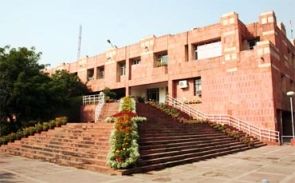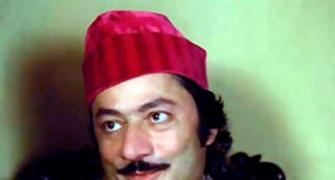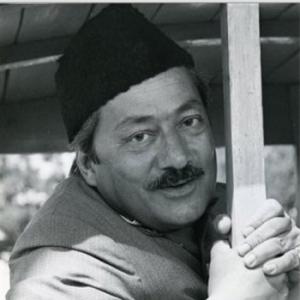 'None of our critics have spoken about JNU's positive contributions. Instead, we are being labelled anti-national. A whole host of BJP leaders are products of JNU including Nirmala Sitharaman.'
'None of our critics have spoken about JNU's positive contributions. Instead, we are being labelled anti-national. A whole host of BJP leaders are products of JNU including Nirmala Sitharaman.'
Rashme Sehgal finds out more about the RSS versus JNU controversy.
Jawaharlal Nehru University has been accused of bucking the present trend of saffronisation sweeping India's educational institutions by rejecting a proposal to introduce short-term courses on yoga and Indian mythology.
A unanimous decision to this effect was reported to have been taken by JNU's Academic Council earlier this month. The refusal irked the Rashtriya Swayamsevak Sangh who accused the university of being anti-national.
The RSS' Hindi weekly Panchjanya attacked JNU, alleging that not only was it 'anti-national,' but it was working to a design whose final objective was the 'disintegration of India.'
'The comments by the RSS are really in bad taste,' JNU Vice-Chancellor S K Sopory shot back. 'We have contributed considerably to nation building. From MPs to Cabinet secretaries to ambassadors, JNU has been home to intellectuals and not anti-nationals.'
'The researchers and students here might be anti-establishment. There is nothing wrong about it, but there is definitely no encouragement to any anti-national activity here, the vice-chancellor said, adding, 'The RSS comment is just an attempt to malign the image of the university.'
The JNU Academic Council consists of senior deans, heads of all the academic centres, senior professors and assistant professors.
Senior academicians present at the Academic Council's meeting believe this is a case of a storm being created in a teacup.
Professor Ayesha Kidwai, professor, Centre for Linguistics, Language, Literature and Culture Studies, JNU, points out that the misreporting can be understood from the fact that media reports suggested a demand had been made to hold yoga classes at the university.
"Yoga is already being taught at JNU," Professor Kidwai said. "A demand was made to teach yoga shastras and Indian culture. But no firm decision has been taken on this subject. It is under consideration since these are matters of academic restructuring."
"The other proposal mooted was to start a separate school to teach Sanskrit. We already have a school for teaching languages, but the bulk of these are foreign languages," Professor Kidwai explained.
"Members of the Academic Council felt they could consider looking into the starting of a separate School for Indian Languages and Sanskrit could be included as one of the languages taught there. But before anything can be initiated, opinions from all other centres must be solicited on this issue," she added.
"The focus of the meeting was the introduction of three new MA courses including one on arts and aesthetics which will focus on Indian theatre, drama and cinema," Professor Anuradha M Chenoy -- who heads the Centre for Russian and Central Asian Studies, and is the Dean, School of International Studies and was present at the Academic Council meeting -- said.
"Another MA programme to be introduced will teach International Relations and Area Studies which will have 36 new courses. The question of teaching a course on Indian mythology was not on the agenda," Professor Chenoy added.
She conceded that the centre for Sanskrit teaching wanted to become a full-fledged school, but the general consensus among members of the Academic Council was that it should be part of a school. "But again, it was decided that a discussion on this would take place at a subsequent date," said Professor Chenoy who expressed unhappiness at how the debate around JNU had become so polarised.
"None of our critics have spoken about all the positive contributions of JNU. These have not been discussed. Instead, we are being labelled as anti-national. But a whole host of BJP (Bharatiya Janata Party) leaders are products of JNU including Nirmala Sitharaman, who is presently a minister," Professor Chenoy pointed out.
"One of the top BJP intellectuals, Sandeep Mahapatra, is a product of JNU as is Professor Kapil Kapoor, who is presently restructuring the University Grants Commission."
"JNU has two kinds of courses -- we have regular MA courses and we also give certificates of proficiency for which no entrance exams are held and which are attended by non-JNU types who can hardly be described as having any serious academic commitment," explained Professor Kamal Mitra Chenoy, who heads the Centre for Comparative Politics and Political Theory, School of International Central Studies.
He maintains that even in the case of courses being held under the banner of certificates of proficiency -- in this case, it was the Department of Sanskrit -- Academic Council members are expected to be provided with a proper course content and a thorough reading list. None of this had been provided.
"The certificates of proficiency do not have entrance examinations and it is often attended by people who have no serious commitment. Certificates of proficiency are given to those who attend these courses. The Academic Council members believed there was need for a detailed course structure with readings and these have been solicited," Professor Kamal Mitra Chenoy added.
Indian mythology, he felt, is a vast subject and so there is a need for greater detailing.
The Sanskrit department circulated a draft of three courses among different schools and departments at JNU. The course on Indian culture looked to expound the importance of India's culture as well as explore its etymological, spiritual, cultural and mythological aspects while looking at different texts and religious systems such as the Vedas, the Jataka Tales and the Hindu epics including the Ramayana.
Dismissing the RSS criticism of the JNU being anti-national, Professor Chenoy said, "Look, we fought the imposition of the Emergency. Three of our students were jailed during the Emergency. I was also to be jailed, but since I came from a Congress family, I was not locked up."
"Students were rusticated, many lost their fellowships. The RSS was barely visible at that time, so they are hardly in a position to call us anti-national," he said.
Professor Krishan Kumar, Chief Proctor, JNU, pointed out that the Academic Council consisted of all the schools at JNU. "The deans, chairpersons, senior most professors and assistant professors are all present," Professor Kumar said, "with all decisions being taken in a democratic and transparent manner."










